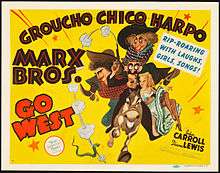
Go West (2005 film)
Go West is a 2005 Bosnia-Herzegovina drama directed by Ahmed Imamović. It tells the story of two gay lovers, one being a Bosniak and the other a Serb, during the Bosnian War. It was developed jointly by two studios, one being in Bosnia and the other in Croatia.
Plot
Kenan (Mario Drmać), a Bosniak classical musician, and Milan (Tarik Filipović), a Serb, live in Sarajevo, Bosnia and Herzegovina in a clandestine gay relationship. When the Bosnian War breaks out in 1992, they try to escape from the city. In order to hide from Serbian militamen, Kenan disguises himself as a woman and Milan passes him of as his wife. Together, they go to Milan's village in Eastern Bosnia, a Serb stronghold, where they continue to live in deception. However, Milan is soon conscripted into the army and Kenan is left behind in the village. Ranka, a woman from the village, discovers Kenan's secret and seduces him.
Cast
Go West
Go West may refer to:
Companies
Film, art and entertainment
Music
- Go West (Go West album), the band's first album in 1985
Songs

Go West (1940 film)
Go West (a.k.a. The Marx Brothers Go West) is the tenth Marx Brothers comedy film, in which brothers Groucho, Chico, and Harpo head to the American West and attempt to unite a couple by ensuring that a stolen property deed is retrieved. It was directed by Edward Buzzell and written by Irving Brecher, who receives the original screenplay credit.
Plot
Confidence man S. Quentin Quale (Groucho) heads west to find his fortune. In the train station, he encounters crafty brothers Joseph (Chico) and Rusty Panello (Harpo) who manage to swindle his money. The Panello's are friends with an old miner named Dan Wilson (Tully Marshall) whose property, Dead Man's Gulch, has no gold. They loan him their last ten dollars for a grub stake and he gives them the deed to the Gulch as collateral. Unbeknownst to Wilson, the son of his longtime rival and beau to his granddaughter Eve Wilson (Diana Lewis), Terry Turner (John Carroll) has contacted the railway to arrange for them to build through the land, making the deed holder rich.

Go West (exhibition)
Go West is the title of the first exhibition by Stuckist artists in a commercial London West End gallery. It was staged in Spectrum London gallery in October 2006. The show attracted media interest for its location, for the use of a painting satirising Sir Nicholas Serota, Director of the Tate gallery, and for two paintings of a stripper by Charles Thomson based on his former wife, artist Stella Vine.
Show
The Stuckists had previously been seen as art world outsiders, but with the backing of a West End gallery in a "major exhibition" became "major players" in the art world. Ten leading Stuckist artists were exhibited.
Royden Prior, the director of Spectrum London, said, "These artists are good and are part of history. Get past the art politics and look at the work."
Art critic Edward Lucie-Smith wrote in an essay for the show:
Rachel Campbell-Johnston, art critic of The Times, condemned the work as "empty of anything much" and "formulaic". Nevertheless, Thomson's and Joe Machine's paintings sold out, before the show opened, to buyers from the UK, Japan and the US.
Podcasts:

